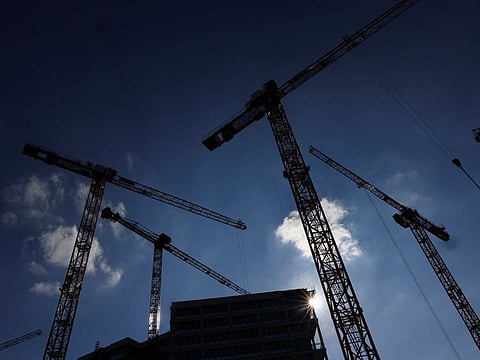As building costs pile up, will property buyers in UAE have to start paying more?
Building material costs, notably that of steel, have shot up since June – and it’s a worry

Dubai: Will property values in the UAE be the next to feel the weight of inflationary costs?
Building material prices have been on the rise again since June, and if this continues through to the year-end, will put further pressure on project costs. If that happens, developers will have no option other than to tag on the higher cost of construction onto their selling price.
For property buyers – especially end-users – any further addition to the property price can be quite a burden. Already, they have to factor in higher mortgage rates (after 11 rate hikes brought on by the US Federal Reserve) and then there is already the run up property values in Dubai since 2021, which has seen projects in some locations asking for even 25-35 per cent more than what they would have in 2020.
"The problem this time is not with a lack of new projects - in fact, each month is seeing new contracts being awarded," said the general manager at a leading construction firm. "There is not much of an issue with payments - that's coming, but with some delays.
The recent – and significant - increase in steel prices is primarily attributed to the rising costs of raw materials, and driven by global supply and demand dynamics. This price surge affects both locally made and imported steel since all manufacturers have to rely on these raw materials.

"What's proving to be a worry is the run up in project costs, and this inflationary pressure is starting to come again at a most inconvenient time."
Developer sources say that adding the higher project costs will only be done at a last resort. “Right now, we are OK because we had placed bulk orders for steel and other building materials well before prices started to firm up from June,” said one developer. “That means, we have not placed a mark-up on or selling price – so far.”
A busy UAE construction sector
The UAE construction sector has been doing quite well year-to-date, as multiple offplan launches keep it busy. There has been major project signings right through this period, apart from the many infrastructure works from government departments.
There was an impressive Dh21 billion in contract awards for the urban sector in Q3-2023

Sudden rise
It was all looking good for UAE developers and construction firms at the start of 2023. Building material prices had dropped considerably from mid-2022 onwards. On some commodities, that change came about even earlier.
So, even as higher inflation became a source of discomfort for businesses across sectors, it wasn’t that much of an issue for developers, at least on the project side of things.
Then, June happened. Steel, concrete and cement prices all made gains, catching many developers completely by surprise.
At Azizi Developments, “We procure construction materials ourselves, sourcing them directly from suppliers and leveraging economies of scale,” said Tizian Raab, spokesperson of the Dubai-based developer looking to launch a new project later this week.
We are able to achieve rates that are significantly better than average market prices, currently paying approximately Dh2,300 per tonne of steel. This has increased by Dh300 since June.

“Since October 2022, we’ve seen steel prices surge 7.5 per cent. Building materials, commodity and even manpower prices have all been on a pronounced upward trajectory due to the demand and supply equation shifting, with construction booming in the UAE and beyond.
“But with accurate forecasting and planning, rising costs can be mitigated, such as through the closing of direct bulk deals with secured rates in advance of project development.”
Cushion buyers
If developers can do that repeatedly, then the risk of having to pass on higher costs to the property buyer is mitigated. While offplan property sales continues to boom in Dubai driven by investors, the market is seeing end-users go back to being cautious. Mortgage negotiations are taking longer, and even with lenders offering 5-year fixed rates from the outset, buyers are wary about costs.
According to a developer source, “There are only so many price increases that end-users can absorb. Building costs had shot up significantly in 2021 – but that was because of the Covid impact on global supply chains and shipping costs. At the time, property values were still recovering from a 5-year slump, and buyers were OK with paying more.
“This time, we need to be extra careful about passing on costs.”
To maintain a balance, some developers have absorbed part of the costs and passed a small portion of the burden onto the buyers.

Flip sides to the cost of construction hike
It is clear that rising costs of construction and materials can squeeze profit margins for developers. To maintain a balance, some developers have absorbed part of the costs and passed a small portion of the burden onto the buyers. It does increase the cost of property but that’s the only way the market can go on. We might have to consider project delays if the cost of construction makes them financially unviable. This could lead to a slowdown in new developments, impacting the overall real estate market. Any passing on of construction costs onto property prices can make it more challenging for individuals and families to afford homes. But keep in mind that developers have only done so by a marginal degree, and the broad swathe of available homes in Dubai real estate are within the reach of buyers. - Ahsan Rasheed, co-founder and Partner, Empire Developments
Sign up for the Daily Briefing
Get the latest news and updates straight to your inbox







